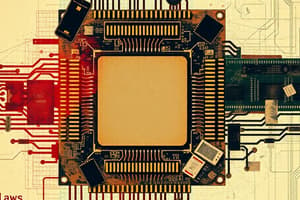Podcast
Questions and Answers
How does operation or experimental science differ from origins (historical) science?
How does operation or experimental science differ from origins (historical) science?
- Operation or experimental science relies on eyewitness testimony, while origins science tests hypothesis predictability with successful experiments.
- Operation or experimental science tests hypothesis predictability with successful experiments, while origins science relies on eyewitness testimony and observable evidence for past events. (correct)
- Operation or experimental science uses observable evidence to determine past events, while origins science focuses on unrepeatable events.
- Operation or experimental science uses reliable eyewitness testimony, while origins science is based on successful experimental testing of hypotheses.
What revolution in European thought began during the time of the Renaissance and the Reformation?
What revolution in European thought began during the time of the Renaissance and the Reformation?
- A revolution in the art industry.
- A change in government structures across Europe.
- A revolution that permanently changed how people viewed the physical world. (correct)
- A movement that focused solely on challenging religious beliefs.
How do assumptions influence scientific investigation according to the text?
How do assumptions influence scientific investigation according to the text?
- They influence the questions asked, what is seen in research, data collection, and interpretation of data. (correct)
- They have no impact on scientific investigation.
- They solely control the questions asked in research.
- They only affect the interpretation of collected data.
How did the Renaissance inspire scholars during the period between 1300 and 1600?
How did the Renaissance inspire scholars during the period between 1300 and 1600?
In what manner did the Reformation differ from the Renaissance?
In what manner did the Reformation differ from the Renaissance?
What role did assumptions play in shaping scientific investigation according to the text?
What role did assumptions play in shaping scientific investigation according to the text?
Why did common sense seem to support the earth-centered view of the universe during the Middle Ages?
Why did common sense seem to support the earth-centered view of the universe during the Middle Ages?
What theory did most scholars during the Middle Ages believe in?
What theory did most scholars during the Middle Ages believe in?
Who challenged the geocentric theory with the heliocentric theory?
Who challenged the geocentric theory with the heliocentric theory?
What was one of the main reasons Copernicus's heliocentric theory was initially rejected?
What was one of the main reasons Copernicus's heliocentric theory was initially rejected?
What characterized the Scientific Revolution in Europe?
What characterized the Scientific Revolution in Europe?
Which Greek astronomer expanded on Aristotle's geocentric theory in the second century A.D.?
Which Greek astronomer expanded on Aristotle's geocentric theory in the second century A.D.?
Flashcards are hidden until you start studying
Study Notes
- Experimental science tests hypotheses through successful experiments to gather scientific evidence and eventually establish a scientific theory.
- Origins (historical) science relies on eyewitness testimony and observable evidence to understand past events that led to present observable evidence.
- Assumptions in scientific investigation influence the questions asked, observations made, data collected, and interpretation of data.
- The period between 1300 and 1600 in Europe saw the Renaissance sparking curiosity and challenging long-held ideas, along with the Reformation challenging religious beliefs.
- Before the Scientific Revolution, scholars based truth on ancient texts or the Bible, with few challenging ideas through direct observation.
- The Medieval View held that the earth was stationary at the center of the universe, known as the geocentric theory, influenced by Aristotle and Ptolemy.
- The Scientific Revolution in the mid-1500s introduced a new way of thinking based on observation and questioning old beliefs, leading to challenges in astronomy like the heliocentric theory.
- Nicolaus Copernicus proposed the heliocentric theory in the 1500s, suggesting that the sun, stars, earth, and planets revolved around the sun, challenging the geocentric view.
Studying That Suits You
Use AI to generate personalized quizzes and flashcards to suit your learning preferences.




